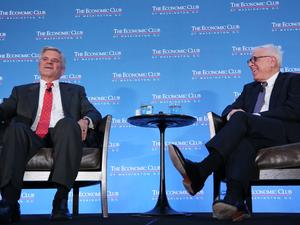
There's no shortage of disinformation in a modern world teeming with media channels. The latest, for example? That schools are putting litter boxes in classrooms for kids who identify as cats.
A video clip has gone viral of podcaster Joe Rogan telling listeners about a school he knows of installing a litter box for a student who “identifies as an animal." That's, in turn, riled up Republican politicians like Colorado Rep. Lauren Boebert, who spread that lie at campaign events to attack what they view as schools' too-liberal positions on gender identity.
To be sure, schools are not doing this. According to a report from NBC News, the only known example is in Columbine, Colorado, where schools have stocked classrooms with small accounts of cat litter so students and teachers can relieve themselves if they are locked down for an extended period during a shooting spree. Columbine High School, of course, was the site of a mass shooting in 1999.
This is the type of disinformation that Pyrra Technologies Inc., a D.C. startup, is trying to combat. Using artificial intelligence and machine learning, Pyrra finds disinformation circulating through alternative social media channels like Rumble and 4chan, to help companies, governments and other organizations get in front of false narratives before they reach the mainstream.
“I’m one of these kind of disinformation transplants," said co-founder and CEO Welton Chang. "I started out thinking about this as a foreign disinformation, information interference problem. Slowly, I came to realize that actually the way we talk to one another online and the quality of our political discourse is much more of a concern.”
Venture capital firm TFX Capital sees promise in Pyrra as well. The Fort Mill, South Carolina, firm recently invested $50,000 in the company after Chang beat out four other competitors in TFX's 6th Annual Veteran Startup Showcase.
“The judges ultimately selected Pyrra due to their unique market opportunity to deploy a solution top of mind for government, media companies and enterprises with an exceptional team positioned to succeed,” said Kevin Eckert, a partner at TFX Capital, which invests in startups run by military and national security veterans.
Pyrra was spun out of nonprofit Human Rights First, which has an office in D.C. but is based in New York, as a research and development project. The technology was originally made for nonprofits to check on message boards and less reputable sites for hate speech and violent threats toward the organization, but Chang and others quickly realized that the technology could have a broader use for governments and private companies facing disinformation attacks.
Chang, who has a doctorate in data science and used to be HRF's chief technology officer, founded Pyrra with another HRF alumnus, Eric Curwin, and Rebecca Jones, the former head of strategy implementation at Airbus Defence and Space.
The technology scans comments and message boards at alternative social media sites, then Pyrra cleans the data and generates a summary for its clients, which include National Public Radio and several nonprofits, Chang said. Its research is also available to media organizations, academics or anyone doing research in the disinformation space.
“Disinformation is a problem that is affecting more and more companies,” Chang said. “There’s a true business case to be made for buying a solution to this.”
The company has seven employees and expects to generate revenue of $200,000 this year. It intends to use the $50,000 from TFX Capital to help build out its sales team.
Chang said he expects more and more organizations to use tools like Pyrra's to fight disinformation, just as they are investing in technology to ward off cyberattacks.
“We’re in the early days of disinformation attacks. It’s very similar to what cybersecurity was like 20 years ago,” Chang said. “[You] heard someone got breached but it didn’t seem like something that would happen. And now the latest stats are investment in cyber startups went above $200 billion."
As for startups hoping to win pitch competitions, Chang’s got some advice.
"Be proud of your story. It’s hard to go from nothing to building something, and to building something people actually want to pay for,” he said. “Each of those steps is a herculean task when you think about it. If you’re motivated by mission and passion, that’s all going to come through.”




